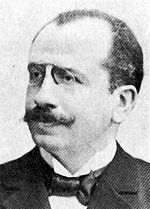About Albert Ballin
- Albert Ballin (15 August 1857 – 9 November 1918) was a German shipping magnate.
- He was the general director of the Hamburg-Amerikanische Packetfahrt-Actien-Gesellschaft (HAPAG) or Hamburg-America Line, which for a time was the world's largest shipping company.
- Being the inventor of the concept of the cruise ship, he is known as the father of modern cruise ship travel. The SS Augusta Victoria, named after the German Empress Augusta Victoria of Schleswig-Holstein, was the first modern cruise ship in the world.
- She set sail on May 10, 1889, from Hamburg to New York City via Southampton.
- Two years later, she went on the world's first Mediterranean cruise. In 1901, Ballin built the Emigration Halls on the Hamburg island of Veddel to accommodate the many thousands of people from all over Europe who arrived at the Port of Hamburg every week to emigrate to North and South America on his company's ships.
- The island is now the BallinStadt Museum.
- In 1913, HAPAG owned three of the world's biggest ocean liners; however all were later seized as part of the war reparations. Facing the loss of his company's ships after World War I, Ballin committed suicide in Hamburg during the German November Revolution in 1918, two days before the end of World War I.
- Later World War II again led to the company's loss of ocean-going ships and global market positions. In the post-war years, HAPAG rebuilt its fleet and focused on cargo container transport.
- In 1970, the container shipping companies HAPAG and North German Lloyd (NGL) merged into Hapag-Lloyd AG to form one of the world's biggest container shipping companies.
- In 2008, Hapag-Lloyd was acquired by the City of Hamburg and a group of private investors, the so-called Albert Ballin Consortium.
Read more at Wikipedia


 Date of Birth:
Date of Birth:  Place of Birth: Hamburg, Germany
Place of Birth: Hamburg, Germany